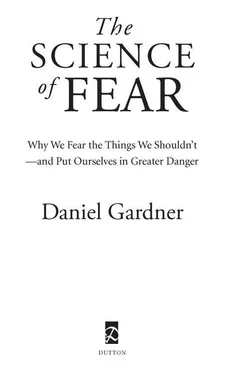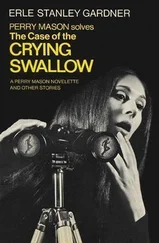Daniel Gardner - The Science of Fear
Здесь есть возможность читать онлайн «Daniel Gardner - The Science of Fear» весь текст электронной книги совершенно бесплатно (целиком полную версию без сокращений). В некоторых случаях можно слушать аудио, скачать через торрент в формате fb2 и присутствует краткое содержание. ISBN: , Издательство: Penguin Group (USA) Incorporated, Жанр: Психология, Политика, Прочая научная литература, на английском языке. Описание произведения, (предисловие) а так же отзывы посетителей доступны на портале библиотеки ЛибКат.
- Название:The Science of Fear
- Автор:
- Издательство:Penguin Group (USA) Incorporated
- Жанр:
- Год:неизвестен
- ISBN:9780525950622
- Рейтинг книги:3 / 5. Голосов: 1
-
Избранное:Добавить в избранное
- Отзывы:
-
Ваша оценка:
- 60
- 1
- 2
- 3
- 4
- 5
The Science of Fear: краткое содержание, описание и аннотация
Предлагаем к чтению аннотацию, описание, краткое содержание или предисловие (зависит от того, что написал сам автор книги «The Science of Fear»). Если вы не нашли необходимую информацию о книге — напишите в комментариях, мы постараемся отыскать её.
The Science of Fear — читать онлайн бесплатно полную книгу (весь текст) целиком
Ниже представлен текст книги, разбитый по страницам. Система сохранения места последней прочитанной страницы, позволяет с удобством читать онлайн бесплатно книгу «The Science of Fear», без необходимости каждый раз заново искать на чём Вы остановились. Поставьте закладку, и сможете в любой момент перейти на страницу, на которой закончили чтение.
Интервал:
Закладка:
14. Benefits: If the benefits of the activity or technology are not clear, it is judged to be riskier.
15. Reversibility: If the effects of something going wrong cannot be reversed, risk rises.
16. Personal risk: If it endangers me, it’s riskier.
17. Origin: Man-made risks are riskier than those of natural origin.
18. Timing: More immediate threats loom larger while those in the future tend to be discounted.
Many of the items on Slovic’s list look like common sense. Of course something that puts children at risk presses our buttons. Of course something that involves only those who choose to get involved does not. And one needn’t have ever heard of the Example Rule to know that a risk that gets more media attention is likely to bother us more than one that doesn’t.
But for psychologists, one item on the list—“familiarity”—is particularly predictable, and particularly important. We are bombarded with sensory input, at every moment, always. One of the most basic tasks of the brain is to swiftly sort that input into two piles: the important stuff that has to be brought to the attention of the conscious mind and everything else. What qualifies as important? Mostly, it’s anything that’s new. Novelty and unfamiliarity—surprise—grab our attention like nothing else. Drive the same road you’ve driven to work every day for the last twelve years and you are likely to pay so little conscious attention that you may not remember a thing you’ve seen when you pull into the parking lot. That is if the drive is the same as it always is. But if, on the way to work, you should happen to see a naked, potbellied man doing calisthenics on his front lawn, your consciousness will be roused from its slumber and you will arrive at work with a memory you may wish were a little less vivid.
The flip side of this is a psychological mechanism called habituation. It’s the process that causes a stimulus we repeatedly experience without positive or negative consequences to gradually fade from our attention. Anyone who wears perfume or cologne has experienced habituation. When you buy a new scent and put it on, you catch a whiff of the fragrance all day long. The next day, the same. But if you wear it repeatedly, you gradually notice it less and less. Eventually, you may smell it only the moment you put it on and you will hardly pay attention to it even then. If you’ve ever wondered how the guy in the next cubicle at work can stand to reek of bad cologne all day, wonder no more.
Habituation is particularly important in coping with risk because risk is everywhere. Have a shower in the morning and you risk slipping and breaking your neck. Eat a poached egg and you could be poisoned. Drive to work and you may be crushed, mangled, or burned alive. Walk to work and carcinogenic solar radiation may rain down on you, or you may be hit by a bus or have a heart attack or be crushed by an asteroid. Of course, the chance of any of these horrible things happening is tiny—exposure to sunshine excepted, of course—and it would be a waste of our mental resources to constantly be aware of them. We need an “off” switch. That switch is habituation.
To carry out her famous observations of chimpanzees, primatologist Jane Goodall sat very still in their midst and watched them go about their ordinary business hour after hour, something that was possible only because the chimpanzees essentially ignored Goodall. To get the chimps to do that, Goodall had to show up and sit down, day after day, month after month, until the animals’ alarm and curiosity faded and they stopped paying attention to her. The same process can be observed in other species. As I am writing this sentence, there is a black squirrel on my windowsill eagerly chewing birdseed without the slightest regard for the large omnivore sitting in a chair just a couple of feet away. The birds that share the seed are equally blasé when I am in my backyard, although I would need binoculars to see them up close in a forest. As for humans, simply recall the white-knuckle grip you had on the steering wheel the first time you drove on a freeway and then think of the last time the sheer boredom of driving nearly caused you to fall asleep at the wheel. If you had been asked on that first drive how dangerous it is to drive on a freeway, your answer would be a little different than it is now that habituation has done its work.
Habituation generally works brilliantly. The problem with it, as with everything the unconscious mind does, is that it cannot account for science and statistics. If you’ve smoked cigarettes every hour, every day, for years, without suffering any harm, the cigarette in your hand won’t feel threatening. Not even your doctor’s warnings can change that, because it is your conscious mind that understands the substance of the warning, and your conscious mind does not control your feelings. The same process of habituation can also explain why someone can become convinced it isn’t so risky to drive a car drunk, or to not wear a seat belt, or to ride a motorcycle without a helmet. And if you live quietly for years in a pleasant Spanish town, you’re unlikely to give a second thought to the fact that your town is built on the slopes of the world’s third-largest active volcano.
For all the apparent reasonableness of Paul Slovic’s list of risk factors, however, its value is limited. The problem is the same one that bedevils focus groups. People know what they like, what they fear, and so on. But what’s the source of these judgments? Typically, it is the unconscious mind—Gut. The judgment may come wholly from Gut, or it may have been modified by the conscious mind—Head. But in either case, the answer to why people feel as they do lies at least partly within Gut. Gut is a black box; Head can’t peer inside. And when a researcher asks someone to say why she feels the way she does about a risk, it’s not Gut she is talking to. It is Head.
Now, if Head simply answered the researcher’s question with a humble “I don’t know,” that would be one thing. But Head is a compulsive rationalizer. If it doesn’t have an answer, it makes one up.
There’s plenty of evidence for rationalization, but the most memorable— certainly the most bizarre—was a series of experiments on so-called split-brain patients by neuroscientist Michael Gazzaniga. Ordinarily, the left and right hemispheres of the brain are connected and communicate in both directions, but one treatment for severe epilepsy is to sever the two sides. Split-brain patients function surprisingly well, but scientists realized that because the two hemispheres handle different sorts of information, each side can learn something that the other isn’t aware of. This effect could be induced deliberately in experiments by exposing only one eye or the other to written instructions. In one version of his work, Gazzaniga used this technique to instruct the right hemisphere of a split-brain patient to stand up and walk. The man got up and walked. Gazzaniga then verbally asked the man why he was walking. The left hemisphere handles such “reason” questions, and even though that hemisphere had no idea what the real answerwas, the man immediately responded that he was going for a soda. Variations on this experiment always got the same result: The left hemisphere quickly and ingeniously fabricated explanations rather than admitting it had no idea what was going on. And the person whose lips delivered these answers believed every word.
When a woman tells a researcher how risky she thinks nuclear power is, what she says is probably a reliable reflection of her feelings. But when the researcher asks the person why she feels the way she does, her answer is likely to be partly or wholly inaccurate. It’s not that she is being deceitful. It’s that her answer is very likely to be, in some degree, a conscious rationalization of an unconscious judgment. So maybe it’s true that what really bothers people about nuclear power are the qualities on Slovic’s checklist. Or maybe that stuff is just Head rationalizing Gut’s judgment. Or maybe it’s a little of both. The truth is, we don’t know what the truth is.
Читать дальшеИнтервал:
Закладка:
Похожие книги на «The Science of Fear»
Представляем Вашему вниманию похожие книги на «The Science of Fear» списком для выбора. Мы отобрали схожую по названию и смыслу литературу в надежде предоставить читателям больше вариантов отыскать новые, интересные, ещё непрочитанные произведения.
Обсуждение, отзывы о книге «The Science of Fear» и просто собственные мнения читателей. Оставьте ваши комментарии, напишите, что Вы думаете о произведении, его смысле или главных героях. Укажите что конкретно понравилось, а что нет, и почему Вы так считаете.












